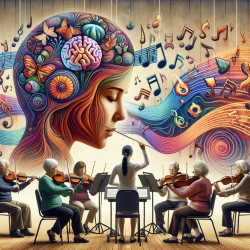Introduction
As a Special Education Director, ensuring that our students receive the best possible support is paramount. One area that often requires attention is auditory processing, particularly in older adults. Recent research, "Interaction of Musicianship and Aging: A Comparison of Cortical Auditory Evoked Potentials," sheds light on how musicianship can positively influence auditory processing in older adults. This blog explores the implications of this research for practitioners and encourages further exploration.
Understanding the Research
The study examined cortical auditory evoked potentials (CAEPs) in both older and younger adults, comparing musicians and nonmusicians. The results indicated that musicianship positively affects auditory processing, particularly in older adults. The research found that musicians, regardless of age, demonstrated superior auditory processing capabilities compared to nonmusicians.
Key Findings
- Musicianship enhances auditory sensory memory and sensitivity to acoustic changes.
- Older musicians showed faster preattentive processing of auditory stimuli compared to nonmusicians.
- Musicianship appears to mitigate age-related decline in auditory processing.
Implications for Practitioners
For practitioners working with older adults, integrating music training into therapy could be beneficial. Here are some practical steps:
- Incorporate music-based activities into therapy sessions to enhance auditory processing.
- Encourage older adults to engage in music training, even if they have no prior experience.
- Collaborate with music educators to develop programs tailored to older adults' needs.
Encouraging Further Research
While the study provides valuable insights, it also highlights the need for further research. Understanding the long-term effects of musicianship on auditory processing in older adults can lead to more effective interventions. Practitioners are encouraged to explore this area further and contribute to the growing body of research.
Conclusion
Musicianship offers a promising avenue for enhancing auditory processing in older adults. By integrating music training into therapeutic practices, practitioners can help mitigate age-related decline and improve overall auditory function. As we continue to explore the intersection of musicianship and aging, the potential benefits for our students and clients are immense.
To read the original research paper, please follow this link: Interaction of Musicianship and Aging: A Comparison of Cortical Auditory Evoked Potentials.










